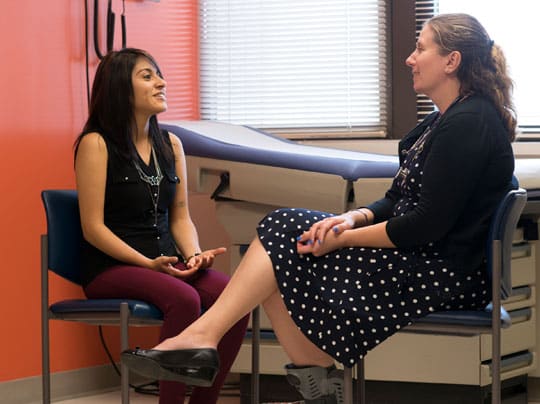Mental health support for children in foster care
- July 11, 2018
- The REACH Institute
- Child mental health, Foster care, High-risk children & youth Medication,

Dr. Elizabeth Wallis, right, talks with a teen in the foster care system.
“We have kids who come in here on three, four different medications,” says Dr. Elizabeth Wallis, MD, “and we don’t know why. We don’t know what data were used to make those decisions.”
Dr. Wallis, director of the Foster Care Support Clinic (FCSC) of the Medical University of South Carolina and a REACH faculty member, was expressing just one of the challenges of treating children and youth in the foster care system.
She cited the case of a boy who came into the clinic just after she completed the REACH Institute course Patient-Centered Mental Health in Pediatric Primary Care (PPP). At age 7, he was in his fourth placement. His new foster family was willing to support him if they saw progress, but they were frustrated with his behaviors.
“This child had been treated for ADHD and aggression,” said Dr. Wallis. “But when I sat down to really assess this kid’s needs, using the tools I got from REACH, I saw that the child was really very anxious. That piece wasn’t being addressed.”
Dr. Wallis and her FCSC colleagues got the child off his medications for aggression and into evidence-based therapy. Four years later, he has been adopted by his foster family. His parents have learned how to respond when he’s feeling anxious or overwhelmed. “Instead of reacting punitively, they encourage him to talk about what is worrying him.”
Now that she is a PPP faculty member, Dr. Wallis uses similar experiences to encourage pediatric clinicians “to be thoughtful about assessment and medication.”
If what you’re doing isn’t working, think about what you’re trying to treat and whether you need to take a different approach. I can teach someone to prescribe an SSRI for depression in half an hour. What’s harder to tease out is, What’s the diagnosis? What’s this kid’s biggest challenge right now? What pieces of the puzzle are missing?
FCSC offers a primary care medical home model of health care for children in foster care and their families. Behavioral health is a big part of providing comprehensive care for this population.
“Kids in foster care have a higher risk of developmental, behavioral, and mental health issues,” said Tracy Halasz, a pediatric nurse practitioner at FCSC who is also a PPP faculty member.
It’s the nature of why they are in care: They’ve been exposed to trauma. Then when they get into the system, they tend to bounce around, causing even more stress.
Halasz describes two frequent patterns of reaction to this toxic stress: “Either they fly under the radar, or they’re loud and make noise.”
In either case, both clinicians agree, the key is to assess the underlying issues rather than turning to medication as a quick fix. In the absence of medical history, use of the tools provided in the REACH training can make all the difference for a troubled young patient.
“These patients have so many externalizing behaviors: wetting the bed, acting out,” said Halasz. “A lot of times, the first priority is to maintain their placement so they can get some stability. One way we support the parents is to help them deal with any challenging behaviors” – another thing Halasz learned in REACH training. “But then we want to deal with the underlying issues too.”
“The primary care provider can play a major role, because they know the family – maybe not the child, but the family, and the resources that are available in the geographic area,” Halasz added.
Asked what they wished every primary care provider knew about foster children, Dr. Wallis said:
Pediatricians are, at core, advocates for children. This population needs advocates more than many. I don’t for a minute think it’s easy or well reimbursed. But we’re grateful that so many are taking this role.
Halasz had another perspective: “The thing to know about children in foster care is that they’re just kids. Many get labelled ‘bad’ because of their externalizing behaviors. But their little brains are just reacting any way they can. Their behaviors are not indicative of the sweet kid underneath.”
Categories
- ADHD
- Anti-racism
- Anxiety
- Assessment & screening
- Autism
- Child mental health
- Coding
- Cognitive behavioral therapy
- College transition
- Culturally responsive
- Depression
- Eating disorders
- Foster care
- Grief
- High-risk children & youth
- LGBTQIA
- Medication
- Parents
- Patient communication
- Pediatric primary care
- School refusal
- Sleep disorders
- Suicide
- Trauma
- Show All Categories
Dates
Register for courses
“Very interesting topics. Great information, facts, links, articles as references. Great role plays and all amazing REACH trainers!”
